#Ancient greek civilisation
Note
https://youtu.be/BNAT4ybsz_E
Rare video of someone discussing about sexuality in Greece.
As a Greek myself i must say that i find frustrating the stereotypes lf Usians, especially with retellings like the Song of Achilles.
Yes there was homosexuality in Ancient Greece and Rome, but there were some problematic like older men using their power over younger men as an experience phase before, or even during marriage, because it was forbidden in society back then.
It had happened also in ancient Japan with the brothels, but in general there wasn't a total freedom back then. What bothers it's just that foreigners take a piece of media and turn a stereotype for a whole country.
In general, I agree there are many problems with the wide misconception that “Ancient Greece was gay”, whatever that means. First of all, often this perception is not used as a way to imagine Ancient Greece as a place of freedoms and acceptance of all orientations but rather as a caricature, as the ultimate Eurovision wonderland. This can be fun at first but after the millionth joke it can soon become disrespectful or annoying when so earnestly spread in its inaccuracy, almost as a whole civilisation is solely defined by a sexuality or sex, like we are the bonobos. Secondly, it is not just used by the LGBT+ community as a way to express themselves or imagine a more hopeful place to have actually existed but from homophobes and anti-Greeks to bash on both. Thirdly, it is simply inaccurate and despite it being good or bad or simply fun, academia is responsible for spreading incorrect misconceptions. It being seemingly harmless doesn’t excuse them for perpetuating a misconception. Fourthly, it is frankly weird to see LGBTQA+ people saying “Ancient Greeks invented homosexuality” which I have seen a thousand times being said, because isn’t it very problematic to suggest, even as a joke, that sexual orientation is a human concept, a trend and a choice????
But now let’s go to the video you recommend. I will give this message the benefit of the doubt. I started watching the video, which makes many valid points and uses numerous ancient sources, and I was getting increasingly uncomfortable without knowing what the motivation of the YouTuber was behind making this video. Was it scientific, strict adherence to a historical truth… or something else? After about two points where I thought he was reaching and some cases where it seemed to me he repeated some offensive views more earnestly than he should, about half time in the video, I paused and searched his channel. Turns out that the guy is an antisemitic white supremacist Elon Musk fanboy. He is cunning enough to stick to facts and keep a polite profile as much as possible but the motive behind it is malicious if you pay attention. And his channel is demonetised. So, I stopped watching and hopefully you watched without noticing all that. The dude is doing all he accused LGBT+ and academia for, simply from the opposite side. He more or less admits himself that he is biased and that he dislikes how LGBT+ community tries to pass Ancient Greece as part of their heritage AND THEN immediately he explains that he dislikes it because he views Ancient Greece as the foundation of his utopic western white world (apparently ruled by straight males).
So as you see, it comes down to the same pattern when it comes to Greece. Marginalised and privileged alike, wronged and hateful westerners alike feel entitled to use the Greek heritage to define themselves and promote their agenda with too little care for historical truth or the moral implications of appropriating foreign heritage simply to serve very specific personal goals (whether good or bad ones). To the homophobes Greeks are macho straight “thoughtfully misogynist” fighters and to LGBTQA+ Greece is an inherent gay parade. Neither is accurate or realistic, if you think about it. Simultaneously, to homophobic Greek haters Greeks are a bunch of losers who of course would eventually lose some lands or wars in question because “they are whimps who like to take it in the butt” and to Greek hating LGBT+ people Greeks are immoral perverts that they shouldn’t be associated with in any way. So, I hope everyone understands why all this is a big problem from all sides.
As for what the truth was, the truth was that a) there were all sorts of sexual orientations in Ancient Greece like it happened in the rest of the ancient and modern world and people experienced them with the pleasures and the hardships that came with them as normal people and not as sex obsessed caricatures , b) there were different approaches on how to deal with less common sexual orientations depending on the era and the place / city-state in question, ranging from very homophobic to relaxed.
As an example, the Homeric era which is so romanticised by the LGBTQA community is most likely not one of the relaxed eras. Classical and Hellenistic period got to be some of the most relaxed and of course Athens in particular. As for pederasty it should not be either excused or beautified or immediately condemned based on modern standards because it normally was not supposed to involve a fully fledged out sexual relationship but we would be kidding ourselves if we denied that several older tutors didn’t take advantage of their protégés. As an example, the YouTuber is reaching when he says that erastes and eromenos simply meant “passionate for knowledge” LOL It is clear in every way that it meant that the young boy was the object of the tutor’s infatuation and / or devotion, regardless if that included a consummated sexual affair. But if erotic love did develop, the tutor was obligated to not lead the boy to an immodest lifestyle (that is, in short, being sexually submissive), which is after all a homophobic solution to a homosexual urgency, which is pretty strange (aside from the whole grooming problem). And pederasty was controversial even in Ancient Athens which established it! In general, we are not equipped to understand well how ancient people thought about sex, sexuality and genders, let alone try to excuse, defend, beautify or ferociously judge and condemn. Study and explore respectfully and impartially to learn more about the history of humanity is the only right way.
TL:DR the video makes many valid points but also reaches when the truth doesn’t benefit OP’s biases and the intent is harmful but presented in a very calculated, polite manner.
#greece#ancient greece#sexuality in the ancient world#Ancient greek civilisation#greek facts#anon#mail
38 notes
·
View notes
Text
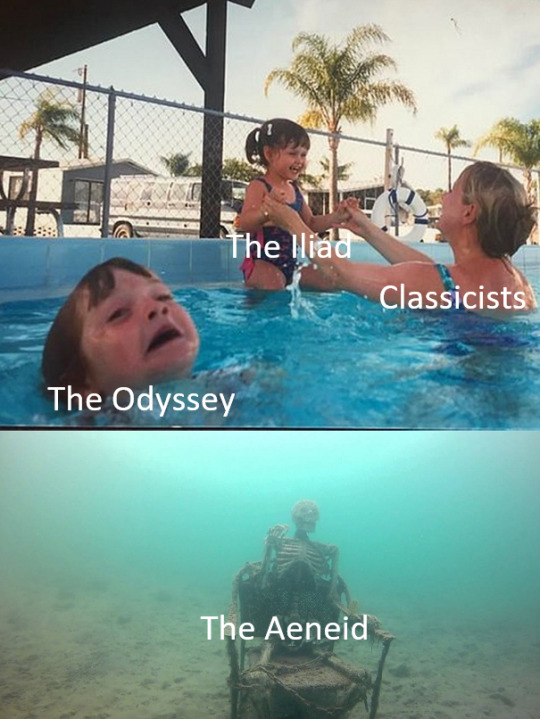
#iliad#odyssey#aeneid#virgil#homer the poet#homer's iliad#homer's odyssey#virgil's aeneid#classical civilisation#classics#greek gods#roman gods#greek mythology#roman mythology#greeks#romans#epics#homeric epics#virgils epic#classical mythology#roman classics#classical history#mediterranean history#ancient history#ancient greek#ancient greece#ancient rome#classics meme#classics memes#tagamemnon
307 notes
·
View notes
Text
I just had a look online to find if anyone had made a list of all the names of fighters in the Iliad, and I discovered that someone in fact had.
I had.
Me.
In 2015.
I have absolutely no memory of this.
I made a spreadsheet, and even wordclouds ffs.

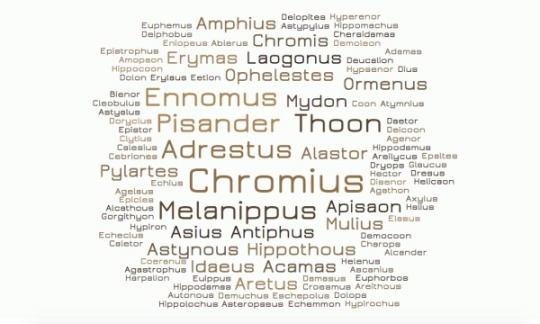
It’s even got what side they’re on, where they’re originally from, their epithet and patronymic if they have one. Wow.
And, you can filter it by any of these to find which version of a character you need.
Oh my god I even put if they brought SHIPS? I made an excel spreadsheet of the CATALOGUE OF SHIPS. (I’m Dyscalculaic though so they might be wrong ha!)
Anyway, thanks, past-fugue-state-me?!
I’m sure I used it to make the Deaths in the Iliad infographic: https://www.tumblr.com/greekmythcomix/722650261704867840/death-in-the-iliad-an-infographic-originally
Anyway, the ‘names in the Iliad’ post is here with links to the spreadsheet: https://greekmythcomix.com/2015/07/21/fighters-in-the-iliad/
Have fun with it!

#Iliad#spreadsheet#greek mythology#greek myth#tagamemnon#homer#greek myth comix#Achaians#Trojans#I work in a fugue state#Achilles#patroclus#achilles and patroclus#research#classics#classical civilisation#ancient literature
906 notes
·
View notes
Text
Welcome to ClassicsTober 2023!
✏️🏺🖊️
In 2021 my friend Dr Cora Beth Fraser and I (@greekmythcomix ) accidentally started ‘Classics-tober’ – a list of Ancient Mediterranean Myth and History prompts for each day in October, so that we had an excuse to draw Classics stuff for a month. We did it again last year and even more people joined in, so we’ll be running it again this year – we’re just putting the final touches to the prompt list for this year. And now that there are a LOT of new Social Media platforms, we’re going to be attempting to run it on as many of them as possible!
The idea is to create something - anything - for the prompt. Like other October prompt lists, it can be an illustration, but it can also be text, reference, historical artefact, video, story, translation... pretty much anything you're interested in from the Ancient Med World that fits with the prompt. There's no pressure to do every single one, just the ones you like.
This year we’ve chosen Ancient Greek Myth Characters, some well-known and others less so.
If you'd like to join in, tag this account and use #ClassicsTober and #ClassicsTober23 on your social media posts when you share them (and if on Tumblr tag this account)
NOTE: please make sure if you share the graphic you add the ALT text (below for you to copy and paste)

ALT:
Classics*-Tober3
Ancient Greek Myth Characters
* meaning Ancient Greece and Rome because no one's come up with a better term yet, but if you want to add additional Ancient Med cultures then yes please - especially if you can link them to versions of these myths/ characters!
1 Cassandra
2 Medusa
3 Asterion
4 Lycaon
5 Chiron
6 Medea
7 Persephone
8 Icarus
9 Achilles
10 Asklepius
11 Pandora
12 Theseus
13 Arachne
14 Helen
15 Prometheus
16 Circe
17 Atalanta
18 Phaedra
19 Sisyphus
20 Odysseus
21 Psyche
22 Midas
23 Orpheus
24 Hephaestus
25 Talos
26 Thetis
27 Pygmalion
28 Nyx
29 Nemesis
30 Tiresias
31 Hecate
#ClassicsTober #ClassicsTober23
Share or create any style of media inspired by the prompt for the day - illustration story, poetry, artefacts, video, translation, anything! Do as many as you like. Share with the hashtags above.
#classicstober#ClassicsTober23#ancient history#ancient Greek myth#greek myth#prompts list#writing#writing prompts#drawing prompts#greek mythology#ancient greek mythology#classical civilisation
180 notes
·
View notes
Text
Hi! Happy Ides of March! I’m going to introduce myself :D
Name: Ro
Age: 18
Pronouns: They/Them
Studying: Classical Studies- with focus on Latin Literature and Archaeology.
Other interests that will inevitably creep into this blog: Palaeontology, Doctor Who. 
I wanted to have a blog on tumblr where I could post about what I’m studying, what I’m reading academically, fascinating things I come across et cetera. I’d also like to wish you all a very happy Ides of March!
Καὶ σύ, τέκνον
(you too, my child)
#classicist#classics#classical civilisation#classical studies#latin#ancient greek#palaeontology#dinosaurs
7 notes
·
View notes
Text
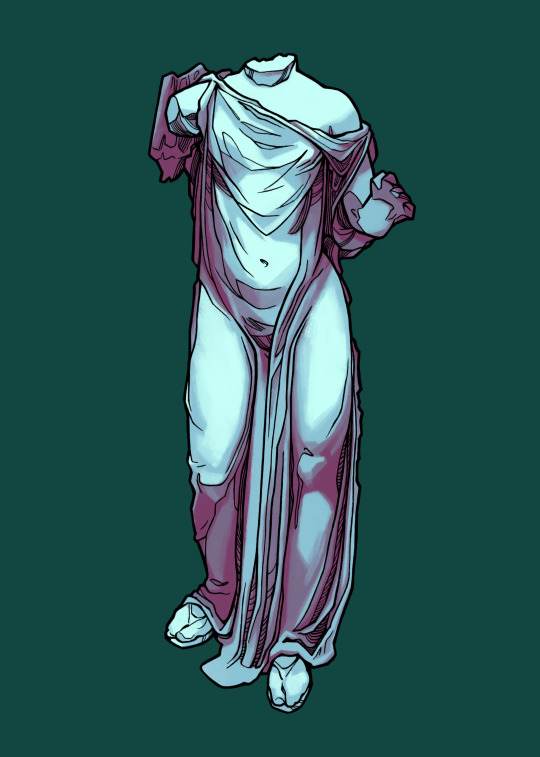
Wet drape figure from the Gallery of Ancient Greece, Royal Ontario Museum.
#illustration#sketchbook#museum#pen and ink#procreate#ancient art#ancient greek culture#ancient greece#classical civilisation#classical sculpture#ancient world
35 notes
·
View notes
Text
Going to uni next month to study English and classical civilisation. Probably going to use here as an escape from my studies, or even a virtual notepad for my thoughts. Follow if you’re into that. Probably Ancient Greek related. Cool. Thanks. Here’s some tags to give the gist of what I’ll probably talk about.
#rome#ancient art#ancient greek#ancient greece#ancient egypt#ancient greek mythology#ancient rome#ancient history#ancient roman history#classical mythology#classical studies#classics#classical civilisation#greek mythology#sparta#athens#parthenon#roman pantheon#hellenism#english#english literature#literature#greek tragedy#greek theatre#greek history#odysseus#aeneas#virgil's aeneid#homer's iliad#homers odyssey
9 notes
·
View notes
Text
How different were the lives of Athenian and Spartan Women? part two - motherhood & education & society

In part one of this series, I discussed the differences between Spartan and Athenian women when it came to the marriage customs of their polis. I will now continue the discussion of their differences in their roles in society - more specifically, motherhood & education.
Motherhood & Education
The value of women in these two societies can be highlighted by how the individual polis educated and prepared its female citizens for motherhood.
The methods Athens used to prepare its female population differ significantly from the process Spartan women passed through. Athens' stance on the involvement of women in the production of children is explained in this extract from Aeschylus' Eumenides:
'I shall explain this- and speak quite bluntly, so note.
She who is called the mother is not her offspring's
Parent, but nurse to the newly sown embryo.
The male - who mounts- begets. The female is a stranger.
Guards a stranger's child if no god bring it harm.
I shall present you evidence that proves my point. There may be a father, and no mother.'
In this description of impregnation, the woman is but a vessel to house an embryo. The Athenian perception is that the role of the mother is passive. She is but a host for all the efforts of men.
Pomeroy explains that women are but a 'fertile field' when it comes to childbearing: a tool for men to create male heirs. (Pomeroy. 1975: 65) This is then reflected in the treatment of women in society. There is no need for physical education or literacy for a girl - in the years that boys pass through schooling, young girls are already married and having children. Women are also barred from many workplaces involving reading and writing, such as political offices.
Due to this, any education a girl is likely to receive in Athens would be domestic, with instruction from their mothers in the practice of weaving and housekeeping.
This is very unlike the girls who were raised in Sparta. While there is no significant amount of evidence recording the learning of reading or writing by Spartan girls - Herodotus recounts the tale of Gorgo, the daughter of Kleomenes I and wife of Leonidas. (Her. Histories. 7.239.4; Milender. 2017: 503) In Herodotus' work, the Spartan princess is responsible for decoding a secret message concerning Xerxes' plan to invade Hellas (Greece). This extract shows Gorgo's ability to comprehend wooden writing tables, and problem-solving at a level equal to the men in this scene, implying a degree of literacy - for at least - noble Spartan women.
The Spartan approach to motherhood stands apart from the Athenian ideas; the woman is more than just a house for the embryo. In Sparta, it is understood that a woman's well-being affects her child's well-being. When looking at Spartan law regarding women, the aim was singular - developing maidens into mothers. (Carroll. 2004. 133)
As explained by Xenophon, the Lycurgan laws demanded a similar level of physical fitness between men and women to produce 'vigorous offspring'. (Xen. Lac. 1.4; Milender. 2017: 506) For women to have time to adhere to this firm regimen, the tasks of maintaining the household would fall to enslaved people (this is not to say Athens didn't also enslave people, their women just worked more in the home). The lady of the house might still have a delegating role, but slave women would complete the many menial tasks. (Xen. Lac. 1.4)
In this instance, Sparta demonstrates care for their female citizens that Athens does not possess; as Plutarch recounts, Spartans believed that their women were the only women who mothered real men. (Plutarch. Sayings of the Spartan Women. 240.5) Because of this view, Spartan mothers were given the circumstances where they might be best able to focus on their most important role: childbearing.
Society
The attitudes perpetuated by Athens' and Sparta's view on motherhood trickled down into other aspects of these women's lives.
In Athens, the household's responsibilities kept a woman confined to her home, fulfilling the demands of her husband, infant, and home. For the wealthier woman, there would be no need to leave her home daily as she would have a collection of enslaved people to send errands on. (Pomeroy. 1975: 80)
An Athenian with little money and therefore fewer enslaved people would find a company with other women in completing small chores outside the home: fetching water, washing clothes, and borrowing utensils. (Pomeroy. 1975: 80)
Other than festivals and funerals, Athens' separation of the sexes was very apparent. The genders were kept separate in public and within the home through private architecture. Men and women inhabited different house sectors, usually with the wife and female slaves occupying the same space. (Pomeroy. 1975: 80) Pomeroy explains the best qualities admired in Athenian girls and women are 'silent, submissive, and abstinent for men's pleasures. (Pomeroy. 1975: 74) The only way an Athenian could fulfil this standard for women would be to keep herself out of public spaces and stay in the household, completing tasks set for them by their husbands or keeping in the company of other women.
However, even the gathering of women was discouraged by Athenian husbands as it was thought gossiping would lead to marital discontent. (Carroll. 2004: 171) So, Athenian women were left with little other than to attend to their children and keep the household in order.
On the other hand, as I have previously mentioned, Spartan women were deterred from extensive housework as they had a much more critical role in maintaining physical fitness and raising children. Unlike segregated Athens, some sources describe the interaction of Spartan men and women in the gymnasium.
'They leave their houses in the company of young men, thighs showing bare through their revealing garments, and in a manner, I cannot endure, they share the same running tracks and wrestling places'. (Eur. Andr. 595-601)
In this extract from Euripides' Andromache, Peleus - King of Pythia - expresses great dislike for Spartan girls being permitted to share the same running tracks and wrestling places as Spartan boys.
The only aspects of training girls and women were kept from were those which would be more beneficial to a soldier, sword fighting or spear throwing.
Another way Spartan women were able to participate in society was through economics. Land ownership in both Athens and Sparta was a privilege of being male. Inheritance passed through the male line, so land and wealth would go from father to son.
However, Sparta provides many examples of wealthy heiresses that either were provided large dowries or were patrouchos (a fatherless and brotherless woman who, by default, gets to inherit her father's property).
In Euripides' Andromache, we are given the characterisation of Hermione (daughter of Helen and Menelaus); through her we get a glimpse of a Spartan woman who has maintained control over the property she was given as a marriage settlement from her father. (Eur. Andr. 147-53, 873-2; Milender. 2017: 511) Hermione uses her inherited wealth to 'speak her mind'.
Later in Spartan history, the ownership of land by women became more commonplace as the male population declined due to military losses. (Martin. 1947: 6.13) Because of this, women with land grew in power and influence, especially in the marriage market.
When a man died, his land was not divided between his sons; it would be inherited by the eldest. So, younger brothers would seek out women with property to avoid poverty - giving landowning women great leverage when finding a husband.
Bibliography
Aeschylus. Eumenides, trans. J. Peller Hallett. [Perseus Digital Library]
Euripides. Andromache, David Kovacs, Ed. [Perseus Digital Library]
Euripides. Iphigenia in Aulis, trans. F. Melian Stawell, [G. Bell] (London, 1929)
Herodotus. The Histories, trans. Aubrey De Sélincourt, [The Penguin Group] (London, 1954)
Plutarch. Lacaenarum Apophthegmata. [Loeb Classical Library edition] (1931)
Xenophon. Constitution of the Lacedaimonians, E. C. Marchant, G. W. Bowersock, tr. Constitution of the Athenians., Ed. Perseus Digital Library.
Carroll, M. Greek Women, [University Press of the Pacifiic] (Honolulu, 2004)
Martin, T.R. An Overview of Classical Greek History from Mycenae to Alexander. [Perseus Digital Library] (1947)
Millender, E.G. ‘Spartan Woman’, in Powell, Anton. Ed. A Companion to Sparta, [John Wiley & Sons, Inc] (New Jersey, 2018)
Pomeroy, S.B. Goddesses, Whores, Wives & Slaves, [Schocken Books Inc] (USA, 1975)
Wells, O. 2021. Love, Sex, & Marriage in Ancient Greece, World History Encyclopaedia. worldhistory.org/article/1713/love-sex—marriage-in-ancient-greece/, 20 November 2021
#classics#classical civilisation#ancient greece#ancient greek#greek#athenians#spartans#sparta#athens#women#athenian women#spartan women#ancient women#uni student
28 notes
·
View notes
Text

4 notes
·
View notes
Text

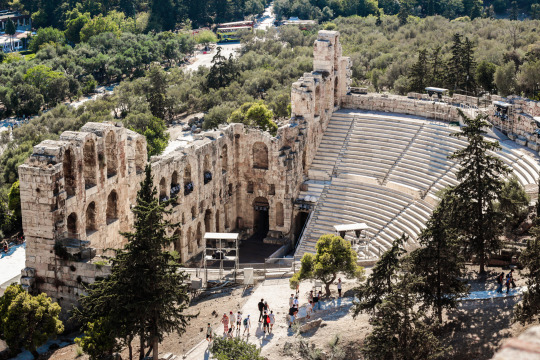
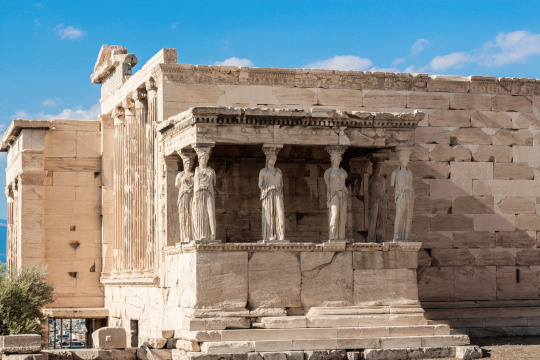
Erechtheion / Propylaea / Odeon of Herodes Atticus. Acropolis, Athens, Greece.
#athens#greece#greek#hellas#acropolis#greek culture#greek history#antiquity#greek antiquity#history#culture#legacy#civilisation#europe#monuments#ancient#ancient architecture#remains#visit#travel#travel photo#travel photography#discovery#trip#voyage#canon#canonphoto#canonphotography#50mm#léo cadra
10 notes
·
View notes
Text
Tomb of Mycenaean baby girl found in Aegina island
A rare find of the tomb and remains of a female infant (12 - 16 months old) with Down syndrome and some other serious skeletal disease, dating from the late Mycenaean period (13th century BCE) was recorded in Aegina island, Greece. The little girl was buried wearing an intricate necklace with 92 beads*, indicating the baby received love and care during her short life and her death, despite her critical condition. This is the first record of a Down syndrome incidence in antiquity in Greece.
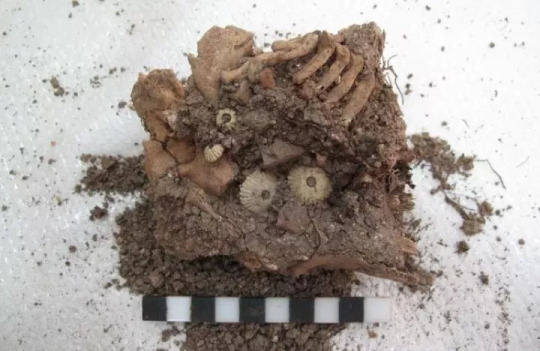
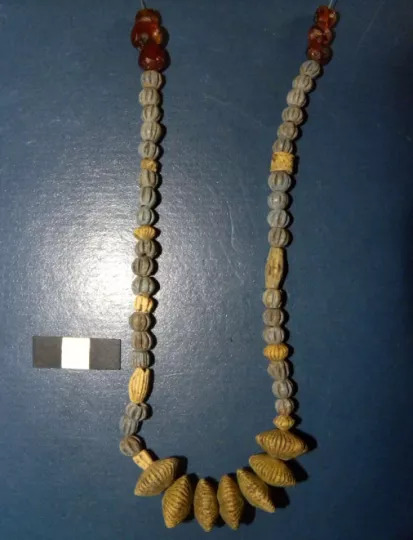
*According to the source. Perhaps not the entirety of the necklace is visible in the photo.
Source
#greece#europe#ancient greece#mycenaean civilisation#mycenaean greece#ancient finds#tw death mention#tw illness#greek history#aegina#saronic islands#sterea hellas#central greece#greek islands
32 notes
·
View notes
Text
Juno/Hera @ the Trojans

#juno#romans#roman mythology#aeneis#the aeneid#virgil's aeneid#aeneas#juno goddess#ancient rome#roman history#classics#classical civilisation#classical history#classical studies#jupiter#usc trojans#the trojan war#greek mythology#classical mythology#hera greek mythology#greek gods#roman gods#tagamemnon#the iliad#iliad#achilles#hector#hera#zeus#apollo
75 notes
·
View notes
Text
Ancient Greek (and Roman) Sacrifice (Jan 2022)

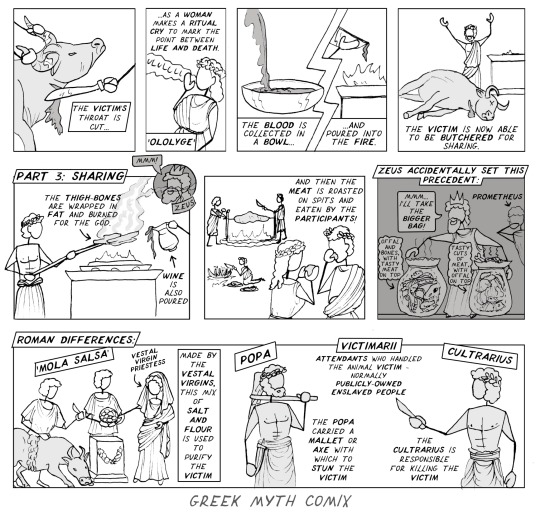
NB: This is a guide for secondary school study.
#ancient greek culture#Ancient Greek sacrifice#greek mythology#tagamemnon#greek myth#illustration#greek myth comix#comix#comic#classroom resources#classical civilisation#sacrifice
154 notes
·
View notes
Text
It’s the last day of #ClassicsTober23 , and I ( @greekmythcomix ) just want to say a massive thank you on behalf of me and Dr Fraser to everyone who has taken part over here on Tumblr, in our third year of running the prompts!
Such. Utterly. Fabulous. Art!
And such creativity in the types of posts!
If you’re on Twitter or Instagram it’s also worth checking out the hashtag - on Twitter particularly we’ve had artefacts: mosaic, pottery, stelae, and sculpture; reception paintings; storytelling; explanatory videos; translation; poetry; memes; cross-cultural mashups; jewellery design; soap, scent and candle creation; musical reception; cross-stitch; sewing patterns; and of course illustration! It has been a FEAST this year and such an amazing celebration of the ancient world!
Thank you all again!
Jenks x
#classicstober23#greek mythology#classicstober#greek myth#ancient greek myth#ancient greek mythology#classical civilisation#greek myth retellings#artwork#original art#classical reception#drawing prompts#media prompts
16 notes
·
View notes
Text
Posts from Sappho to Homer to Ovid, main hub on Instagram @/homefromhomer
0 notes
Text
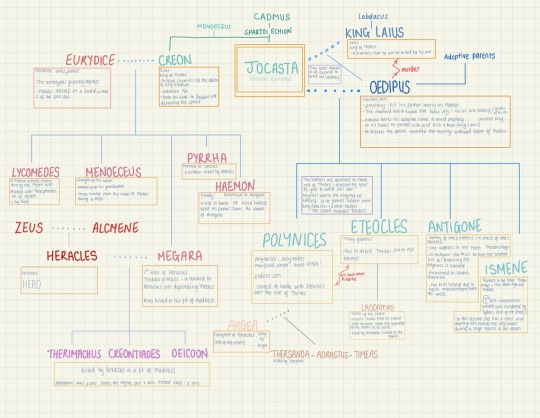
A confusing family tree…
#ancient greece#ancient greek#classical civilisation#Thebes#oedipus the king#oedipus rex#the children of Jocasta#sophocles#greek mythology#greek#classics#uni student
11 notes
·
View notes